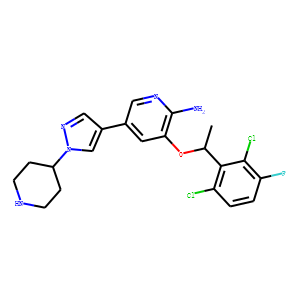| Reference | 1. Expert Rev Anticancer Ther. 2012 Feb;12(2):151-62. doi: 10.1586/era.11.186.
<br>
Crizotinib: a drug that crystallizes a unique molecular subset of non-small-cell
lung cancer.
<br>
Ou SH(1).
<br>
Author information: <br>
(1)Department of Medicine, Division of Hematology Oncology, Chao Family
Comprehensive Cancer Center, University of California Irvine Medical Center, 101
City Drive, Building 56, Orange, CA 92868, USA. [email protected]
<br>
Crizotinib (Pfizer, CA, USA) is an oral small-molecule RTK inhibitor that targets
ALK and MET, and potentially other RTKs. Crizotinib was approved by the US FDA on
26 August 2011 for the treatment of ALK-rearranged non-small-cell lung cancer
(NSCLC), as detected by ALK break-apart FISH assay. This conditional approval was
based on response rates of 50-61% from 255 ALK-rearranged NSCLC patients enrolled
in two ongoing single-arm crizotinib trials. Side effects of crizotinib mostly
consist of grade 1-2 gastrointestinal events (nausea, vomiting, diarrhea and
constipation), grade 1-2 edema and fatigue, grade 1 visual disorders, rare cases
of elevated liver enzymes and pneumonitis (1.6%). Confirmatory trials comparing
crizotinib to standard chemotherapy in upfront (ClinicalTrials.gov identifier:
NCT01154140) and salvage (ClinicalTrials.gov identifier: NCT00932451) treatment
settings of ALK-rearranged NSCLC are ongoing. It took an unprecedented rapid 4
years from the publication of the discovery of ALK-rearranged NSCLC in August
2007 to the conditional approval of crizotinib in August 2011.
<br>
2. Oncologist. 2012;17(11):1351-75. doi: 10.1634/theoncologist.2012-0311. Epub 2012
Sep 18.
<br>
Crizotinib for the treatment of ALK-rearranged non-small cell lung cancer: a
success story to usher in the second decade of molecular targeted therapy in
oncology.
<br>
Ou SH(1), Bartlett CH, Mino-Kenudson M, Cui J, Iafrate AJ.
<br>
Author information: <br>
(1)Chao Family Comprehensive Cancer Center, University of California Irvine
Medical Center, Orange, California 92868, USA. [email protected]
<br>
Crizotinib, an ALK/MET/ROS1 inhibitor, was approved by the U.S. Food and Drug
Administration for the treatment of anaplastic lymphoma kinase (ALK)-rearranged
non-small cell lung cancer (NSCLC) in August 2011, merely 4 years after the first
publication of ALK-rearranged NSCLC. The crizotinib approval was accompanied by
the simultaneous approval of an ALK companion diagnostic fluorescent in situ
hybridization assay for the detection of ALK-rearranged NSCLC. Crizotinib
continued to be developed as an ALK and MET inhibitor in other tumor types driven
by alteration in ALK and MET. Crizotinib has recently been shown to be an
effective ROS1 inhibitor in ROS1-rearranged NSCLC, with potential future clinical
applications in ROS1-rearranged tumors. Here we summarize the heterogeneity
within the ALK- and ROS1-rearranged molecular subtypes of NSCLC. We review the
past and future clinical development of crizotinib for ALK-rearranged NSCLC and
the diagnostic assays to detect ALK-rearranged NSCLC. We highlight how the
success of crizotinib has changed the paradigm of future drug development for
targeted therapies by targeting a molecular-defined subtype of NSCLC despite its
rarity and affected the practice of personalized medicine in oncology,
emphasizing close collaboration between clinical oncologists, pathologists, and
translational scientists.
<br>
3. Drug Des Devel Ther. 2011;5:471-85. doi: 10.2147/DDDT.S19045. Epub 2011 Nov 23.
<br>
Crizotinib: a novel and first-in-class multitargeted tyrosine kinase inhibitor
for the treatment of anaplastic lymphoma kinase rearranged non-small cell lung
cancer and beyond.
<br>
Ou SH(1).
<br>
Author information: <br>
(1)Chao Family Comprehensive Cancer Center, University of California Irvine
Medical Center, Orange, CA 92868, USA. [email protected]
<br>
Epidermal growth factor receptor (EGFR) tyrosine inhibitors were first approved
for the treatment of non-small cell lung cancer (NSCLC) in 2003 in the US.
Activating EGFR mutations were subsequently discovered in 2004, and heralded the
era of molecular targeted therapy in NSCLC. The discovery of anaplastic lymphoma
kinase (ALK) rearrangement in NSCLC in 2007 by two independent groups not only
represents the first time ALK rearrangement has been discovered in common solid
tumors but also represents another important milestone in the era of molecular
targeted therapy in NSCLC. Crizotinib, a mesenchymal-epithelial transition
(MET)/ALK multi-targeted receptor tyrosine kinase inhibitor went into early Phase
I clinical development in 2007. Using the knowledge that NSCLC patients with
activating EGFR mutations benefited from EGFR tyrosine kinase inhibitors,
crizotinib was rapidly and successfully developed as an inhibitor in
ALK-rearranged NSCLC, based on a break apart fluorescence in situ hybridization
assay, developed by two of the crizotinib Phase I sites. It cumulated in the
conditional approval of crizotinib by the US Food and Drug Administration on
August 26, 2011 for the treatment of ALK-rearranged NSCLC. The conditional
approval was based on response rates of 50% and 61% from 255 ALK-rearranged NSCLC
patients enrolled in two single-arm trials. Common adverse events of crizotinib
include mild transient visual disorders, mild gastrointestinal toxicities,
fatigue, rare alanine transaminase elevations, and even rarer pneumonitis (1.6%).
Confirmatory trials comparing crizotinib with standard chemotherapy are ongoing.
It took an unprecedented four years from the discovery of ALK rearrangement in
NSCLC to the approval of crizotinib, the first ever ALK inhibitor, for the
treatment of ALK-rearranged NSCLC.
<br>
|

